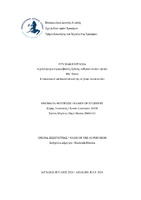| dc.contributor.advisor | HOUHOULA, DIMITRA | |
| dc.contributor.author | Κόμης, Λουκιανός | |
| dc.contributor.author | Σιούτη, Μαρίνα | |
| dc.date.accessioned | 2024-07-31T13:52:39Z | |
| dc.date.available | 2024-07-31T13:52:39Z | |
| dc.date.issued | 2024-07-26 | |
| dc.identifier.uri | https://polynoe.lib.uniwa.gr/xmlui/handle/11400/7277 | |
| dc.identifier.uri | http://dx.doi.org/10.26265/polynoe-7109 | |
| dc.description.abstract | Τα αιθέρια έλαια είναι συμπυκνωμένα υγρά με πολύπλοκη σύνθεση, πλούσια σε βιοδραστικές ενώσεις, όπως τερπένια, αλδεΰδες, εστέρες, φαινόλες και αλκοόλες, οι οποίες συμβάλλουν στις μοναδικές ιδιότητες τους. Αυτές οι ενώσεις τους επιτρέπουν να χρησιμοποιούνται σε διάφορους τομείς, όπως η αρωματοθεραπεία, η φαρμακευτική, η κοσμετολογία και η βιομηχανία τροφίμων. Η όλο ένα και αυξανόμενη απαίτηση των καταναλωτών για τρόφιμα χωρίς συνθετικές χημικές προσμίξεις, τα οποία θα έχουν και μακρά διάρκεια ζωής στα ράφια, καθώς και η ανάπτυξη ανθεκτικότητας των μικροοργανισμών στα αντιβιοτικά φάρμακα, έχουν στρέψει το ενδιαφέρων των ερευνητών στην εύρεση νέων φυσικών αντιμικροβιακών παραγόντων. Στην παρούσα μελέτη έγινε αξιολόγηση της αντιμικροβιακής, κυτταροτοξικής και αντιικής δράσης των αιθέριων ελαίων των φυτών Posidonia oceanica και Cistus creticus L. έναντι των βακτηριακών στελεχών B. cereus, E. faecalis, L. monocytogenes, S. aureus, E. coli, K. pneumoniae, P. aeruginosa, S. enterica και του μύκητα C. albicans, σε τρία χρονικά διαστήματα. Για την παραλαβή των αιθέριων ελαίων πραγματοποιήθηκε εκχύλιση με νερό και με αιθανόλη και έγινε σύγκριση των δύο διαλυτών. Τα αποτελέσματα έδειξαν ότι το αιθέριο έλαιο από τα Φύκη, που είχε προκύψει από εκχύλιση με νερό, είχε αντιμικροβιακή δράση έναντι του S. aureus και της S. enterica, ενώ το έλαιο που προέκυψε από εκχύλιση με αιθανόλη, έδειξε αναστολή ανάπτυξης στα B. cereus, E. faecalis, S. aureus και E. coli. Αντίστοιχα, το αιθέριο έλαιο Κουνούκλας, που είχε προκύψει από εκχύλιση με νερό, ανέστειλε την ανάπτυξη του B. cereus, S. aureus, E. coli και C. albicans, ενώ το έλαιο που προέκυψε από εκχύλιση με αιθανόλη ανέστειλε τα B. cereus, E. faecalis και S. aureus. Τέλος, η αξιολόγηση της κυτταροτοξικότητας της Κουνούκλας έδειξε αρκετά θετικά αποτελέσματα, ενώ αντίθετα η αντιική της δράση είναι αρκετά χαμηλή. | el |
| dc.format.extent | 76 | el |
| dc.language.iso | el | el |
| dc.publisher | Πανεπιστήμιο Δυτικής Αττικής | el |
| dc.rights | Αναφορά Δημιουργού - Μη Εμπορική Χρήση - Παρόμοια Διανομή 4.0 Διεθνές | * |
| dc.rights | Attribution-NonCommercial-NoDerivatives 4.0 Διεθνές | * |
| dc.rights | Attribution-NonCommercial-NoDerivatives 4.0 Διεθνές | * |
| dc.rights | Attribution-NonCommercial-NoDerivatives 4.0 Διεθνές | * |
| dc.rights.uri | http://creativecommons.org/licenses/by-nc-nd/4.0/ | * |
| dc.subject | Φυτικά εκχυλίσματα | el |
| dc.subject | Αιθέρια έλαια | el |
| dc.subject | Φύκη | el |
| dc.subject | Κουνούκλα | el |
| dc.subject | P. oceanica | el |
| dc.subject | C. creticus | el |
| dc.subject | Παθογόνοι μικροοργανισμοί | el |
| dc.subject | HPLC-DAD | el |
| dc.subject | Αντιμικροβιακή δράση | el |
| dc.subject | Κυτταροτοξικότητα | el |
| dc.subject | Αντιικότητα | el |
| dc.title | Αξιολόγηση αντιμικροβιακής δράσης αιθέριων ελαίων φυτών | el |
| dc.title.alternative | Evaluation of antibacterial activity of plant essential oils | el |
| dc.type | Πτυχιακή εργασία | el |
| dc.contributor.committee | Batrinou, Anthimia | |
| dc.contributor.committee | Αντωνόπουλος, Διονύσιος | |
| dc.contributor.faculty | Σχολή Επιστημών Τροφίμων | el |
| dc.contributor.department | Τμήμα Επιστήμης και Τεχνολογίας Τροφίμων | el |
| dc.description.abstracttranslated | Essential oils are concentrated liquids with a complex composition, rich in bioactive compounds such as terpenes, aldehydes, esters, phenols and alcohols, which contribute to their unique properties. These compounds allow them to be used in various fields such as aromatherapy, pharmaceuticals, cosmetology and the food industry. The ever-increasing consumer demand for artificial chemical-free foods with a long lifespan, as well as the development of resistance of microorganisms to antibiotic drugs, have focused the interest of researchers on finding new natural antimicrobial agents. In the present study, the antimicrobial, cytotoxic and antiviral activity of essential oils of Posidonia oceanica and Cistus creticus L. plants were evaluated against bacterial strains B. cereus, E. faecalis, L. monocytogenes, S. aureus, E. coli, K. pneumoniae, P. aeruginosa, S. enterica and C. albicans fungus at three-time courses. To obtain the essential oils, extraction with water and ethanol was carried out and the two solvents were compared. The results showed that the algal essential oil obtained from extraction with water had antimicrobial activity against S. aureus and S. enterica, while the oil obtained from extraction with ethanol showed growth inhibition on B. cereus, E. faecalis, S. aureus and E. coli. Similarly, the pink rock rose essential oil obtained from extraction with water inhibited the growth of B. cereus, S. aureus, E. coli and C. albicans, while the oil obtained from extraction with ethanol inhibited B. cereus, E. faecalis and S. aureus. Finally, the evaluation of the cytotoxicity of the pink rock rose showed quite positive results, while in contrast its antiviral activity is quite low. | el |



